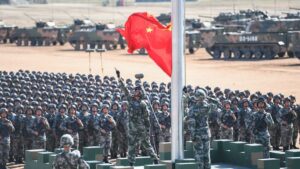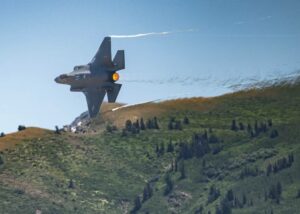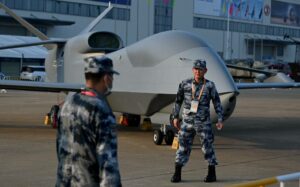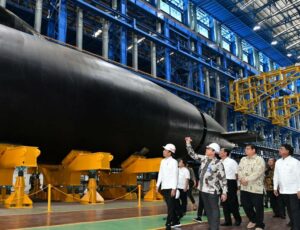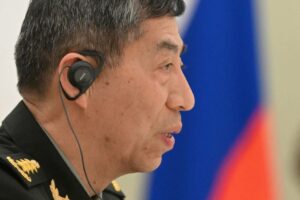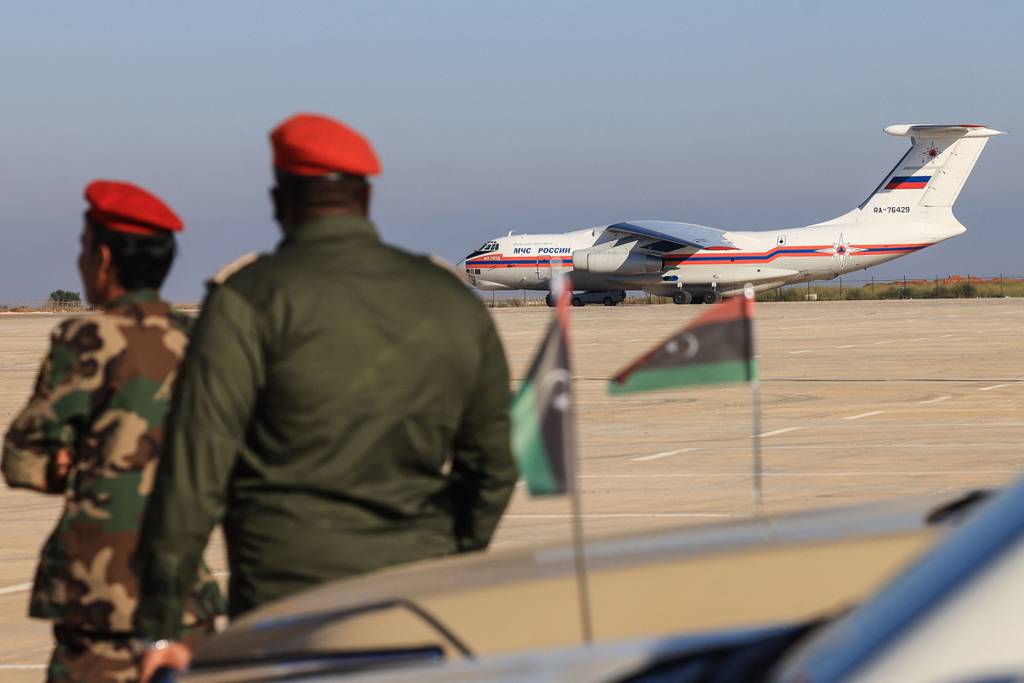
ROME — — A visit by Russia’s deputy defense minister to Libya on Sunday — his fourth in six months — represents how keen Moscow is on making the African nation another stepping stone to influence the region, according to an analysts.
Russia wants gold, diamonds and to be a guide for the global south,” said Chiara Lovotti, a Middle East and North Africa expert with the Italian think tank ISPI, using a term for developing countries and their Eastern allies.
The Russian official, Yunus-Bek Yevkurov, was in Benghazi to meet the warlord of eastern Libya Gen. Khalifa Hifter and improve ties forged in 2020 when Russian mercenary organization Wagner Group helped Hifter in his unsuccessful bid to oust the U.N.-backed government running western Libya.
Four years on, and following the death of Wagner boss Yevgeny Prigozhin last year, Yevkurov is now bringing Wagner mercenaries under Moscow’s control and rebranding them as Russia’s Africa Corps.
“The Africa Corps will not consist solely of Russian regulars; a mercenary logic will persist, meaning some services will be provided for a fee and some of the operations will remain covert,” said Jalel Harchaoui, a North Africa analyst at the London-based Royal United Services Institute think tank.
In eastern Libya, where analysts put the Russian head count at between 800 and 1,000, there are air bases like al-Jufra that provide Russian military flights with a stopover before heading south to other countries, including the Central African Republic, where Moscow has helped the government fight rebels.
As French influence fades on the continent, Russia has courted recent military coup leaders in Niger and Mali, both of which Yevkurov visited last month, and Burkina Faso, which recently said it received 25,000 tons of free wheat from Russia.
As well as eyeing eastern Libya as a stepping stone into Africa, Russia is also reportedly discussing the use of its coastal city Tobruk as a base for naval vessels. That access would give Russia another Mediterranean naval base to add to its two berths in Syria — Tartus and Latakia.
“A potential naval base facility in Libya could help Russia increase its foothold and influence in North Africa,” said Nick Childs, a naval analyst at the International Institute for Strategic Studies think tank in London. “In naval terms in the Mediterranean, much will depend on what facilities are actually available and whether Russia will have the option to develop them to support a wider range of assets, including submarines.”
“If so, that could significantly enhance its ability to sustain a credible naval capability in the region,” he added.
But if facilities in Libya proved limited, this would mirror Russia’s predicament in Syria, where its Navy cannot carry out “deep repair and maintenance,” he noted.
Umberto Profazio, a North Africa specialist at IISS, explained that “Tobruk is a deep-water port, and it would offer Russia a triangulation between it, its Syrian ports and Port Sudan.”
Russia has been negotiating a Red Sea naval base in Sudan.
In exchange for allowing Moscow to use air bases and ports, Hifter will expect Russian personnel to continue operating air defense systems in the country as protection against Turkey’s military presence in western Libya.
“In 2022 Hifter blocked oil production in eastern Libya, and he does not want to be worried about Turkish drones if he tries that again,” Harchaoui said. “The Russians also shot down a U.S. Reaper [drone] over Benghazi in 2022.”
The U.S. has recently tried to woo Hifter away from Russia’s influence, but that has not gone smoothly. Gen. Michael Langley, the head of U.S. Africa Command, visited Libya in September, only for Hifter to pay a visit to Moscow the same month.
Four days after Yuvkerev’s trip to Libya in December, a Russian Ilyushin Il-76 cargo plane was destroyed at the al-Jufra air base — the second such incident in a year.
“If the U.S. is doing this, it may be a way to hurt Russia without harming Hifter,” Harchaoui said. “The problem is the Russians may have decided that losing two cargo plans in a year is a price worth paying for being in Libya.”
Tom Kington is the Italy correspondent for Defense News.
- SEO Powered Content & PR Distribution. Get Amplified Today.
- PlatoData.Network Vertical Generative Ai. Empower Yourself. Access Here.
- PlatoAiStream. Web3 Intelligence. Knowledge Amplified. Access Here.
- PlatoESG. Carbon, CleanTech, Energy, Environment, Solar, Waste Management. Access Here.
- PlatoHealth. Biotech and Clinical Trials Intelligence. Access Here.
- Source: https://www.defensenews.com/global/mideast-africa/2024/02/02/what-military-advantage-could-russia-get-out-of-libya/
- :has
- :is
- :not
- :where
- 000
- 1
- 10
- 1999
- 2020
- 2022
- 25
- 3000
- 5
- 70
- 800
- 9
- a
- ability
- About
- access
- According
- actually
- add
- added
- ADvantage
- africa
- African
- After
- again
- against
- AIR
- Allowing
- also
- an
- analyst
- Analysts
- and
- Another
- ARE
- Army
- AS
- Assets
- At
- available
- away
- base
- BE
- been
- before
- being
- between
- blocked
- BOSS
- both
- Bringing
- but
- by
- cannot
- capability
- Cargo
- carry
- central
- Central African Republic
- City
- coastal
- consist
- continent
- continue
- control
- corps
- could
- count
- countries
- country
- credible
- Days
- Death
- December
- decided
- Defense
- depend
- deputy
- destroyed
- develop
- developing
- Developing Countries
- discussing
- does
- doing
- down
- drone
- Drones
- East
- eastern
- enhance
- exchange
- expect
- expert
- explained
- facilities
- Facility
- Fades
- fee
- fight
- Flights
- following
- For
- forged
- Fourth
- Free
- French
- from
- Gen
- get
- Give
- Global
- Gold
- gone
- Government
- Group
- guide
- harming
- Have
- he
- head
- Heading
- help
- helped
- his
- How
- HTTPS
- Hurt
- if
- image
- images
- improve
- in
- incident
- Including
- Increase
- influence
- Institute
- International
- into
- IT
- Italian
- Italy
- ITS
- jpg
- Keen
- Last
- Last Year
- leaders
- Libya
- like
- Limited
- logic
- London
- losing
- maintenance
- Making
- May..
- meaning
- Mediterranean
- Meet
- Michael
- Middle
- Middle East
- Military
- minister
- mirror
- Month
- months
- Moscow
- much
- nation
- news
- nick
- North
- noted
- now
- of
- offer
- official
- Oil
- on
- only
- operating
- Operations
- Option
- organization
- Other
- out
- over
- Pay
- paying
- Personnel
- plane
- plans
- plato
- Plato Data Intelligence
- PlatoData
- ports
- potential
- presence
- price
- Problem
- Production
- protection
- proved
- provide
- provided
- put
- range
- rebranding
- received
- recent
- recently
- Red
- region
- remain
- repair
- reportedly
- represents
- Republic
- royal
- running
- Russia
- russian
- Russians
- s
- Said
- same
- SEA
- Second
- September
- Services
- shot
- Shows
- significantly
- SIX
- Six months
- smoothly
- So
- solely
- some
- South
- specialist
- stepping
- STONE
- Strategic
- studies
- such
- Sudan
- sunday
- support
- suspected
- Syria
- Systems
- tank
- term
- terms
- that
- The
- their
- Them
- There.
- think
- think tank
- this
- three
- Ties
- to
- tons
- tried
- tries
- trip
- Turkish
- two
- u.s.
- under
- United
- use
- using
- vessels
- via
- Visit
- visited
- want
- wants
- was
- Way..
- WELL
- Western
- What
- when
- whether
- which
- wider
- will
- with
- without
- Woo
- worried
- worth
- would
- would give
- year
- years
- zephyrnet


